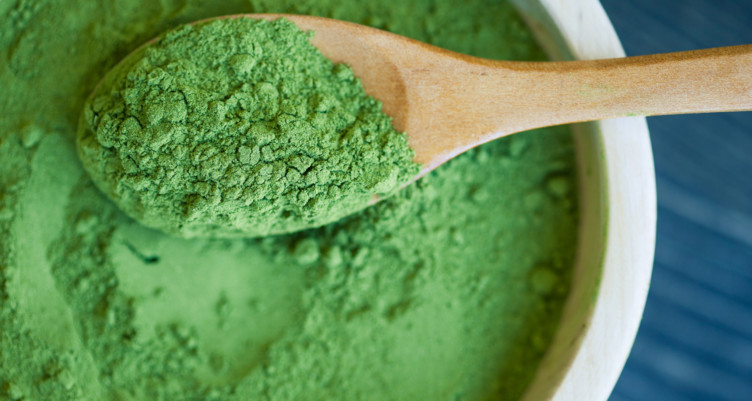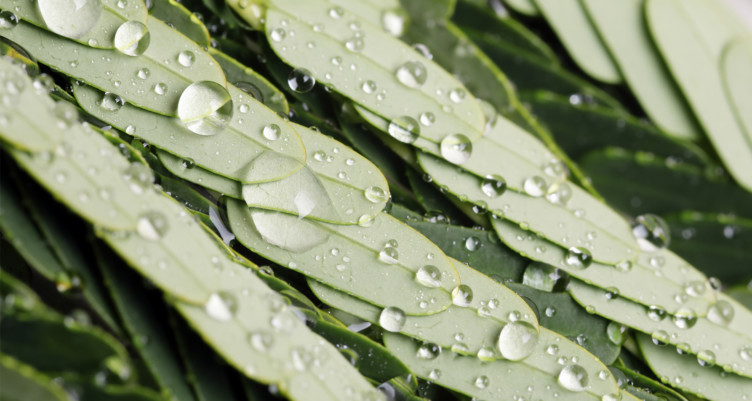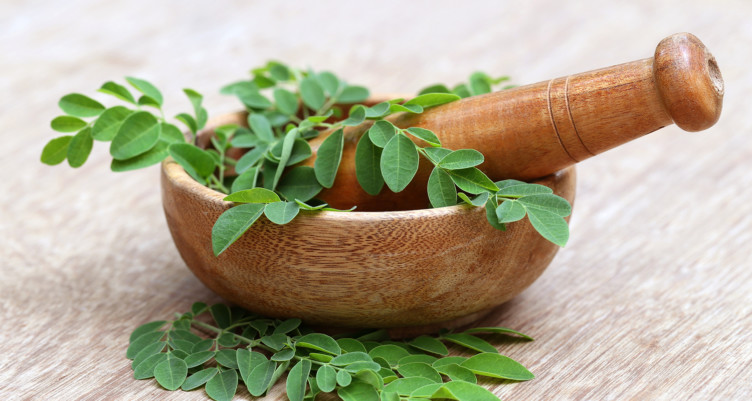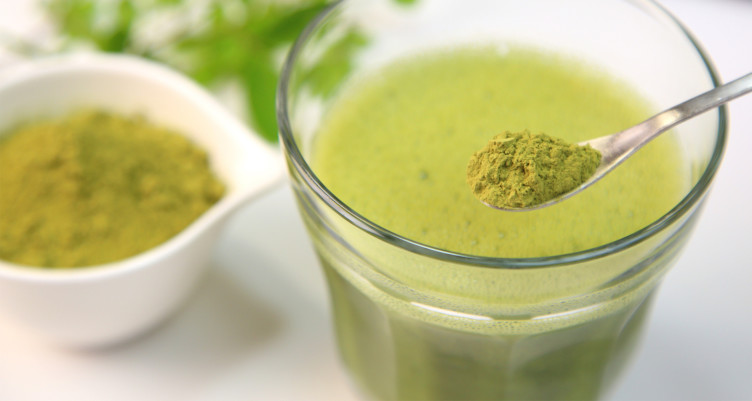Moringa Benefits: Why You Need This Superfood Supplement

- Virtually all parts of the moringa tree are useful as food and medicine, but the most potent nutritional content and healing properties come from the moringa leaves.
- Moringa has more vitamin C than oranges, more vitamin A than carrots, more potassium than bananas, and more iron than spinach.
- Moringa is high in antioxidants and compounds that are beneficial for health and cognition.
- You can take moringa supplements or moringa powder — both of which contain ground moringa leaves.
Heard of moringa? If not, you soon will. This strange-sounding leaf powder supplement is one of the latest superfoods to gain the limelight — and for good reason. Moringa boasts a powerhouse of free-radical-fighting, health promoting compounds that benefit your heart, head, skin, and more.
Moringa, a nutrient-packed plant found in India, is also known as the “miracle tree.” It has been used for generations to treat skin, digestive, and heart conditions, to name a few. And it possesses more antioxidants than other superfoods like acai and green tea.
Want to learn more about moringa’s benefits? Here’s your quick guide to what moringa can bring to your plate, and how to best use this powerful little plant.
Related: Best Supplements for Stress, Sex, Sleep & Mood
What is moringa?
 While still new to the West, this small tree, moringa oleifera, has been highly valued for centuries in southeast Asia, where it is used in everything from fiber, rope, and dye, to fertilizer, spices and medicines.[1]
While still new to the West, this small tree, moringa oleifera, has been highly valued for centuries in southeast Asia, where it is used in everything from fiber, rope, and dye, to fertilizer, spices and medicines.[1]
In fact, all parts of this plant are useful and edible — hence the name “miracle tree.” Other names it goes by include, horseradish tree, ben tree, and drumstick tree. Whatever you call it, moringa seeds, flowers, fruits, roots and leaves are all used for food, and each packed with phytonutrients, proteins and minerals. But the most potent nutritional content and healing properties come from the moringa leaves. The leaves are edible raw and cooked, although in the U..S, you’re most likely to find them dried and ground in powders or capsules.
Moringa nutrition
 Moringa gets its superfood status from a rich nutrition profile, providing more nutrients per gram than many other plant species. The nutrient density of moringa varies by growing conditions and preparation, but many studies rank moringa with more vitamin C than oranges, more vitamin A than carrots, more potassium than bananas, and more iron than spinach.[2]Moringa is also high in protein, and contains an impressive 8 of the 9 essential amino acids, a rare trait in plant-based proteins.[3]
Moringa gets its superfood status from a rich nutrition profile, providing more nutrients per gram than many other plant species. The nutrient density of moringa varies by growing conditions and preparation, but many studies rank moringa with more vitamin C than oranges, more vitamin A than carrots, more potassium than bananas, and more iron than spinach.[2]Moringa is also high in protein, and contains an impressive 8 of the 9 essential amino acids, a rare trait in plant-based proteins.[3]
But incredible nutrient density isn’t the last of moringa’s claims to superfood fame. Up next: the top health benefits of moringa supplements.
Moringa benefits
Lowers blood sugar and protects against diabetes
 May help those with diabetes: Moringa leaf is a useful natural supplement for diabetes, and may even reverse type 1 and 2 diabetes in studies with rats.[4]
May help those with diabetes: Moringa leaf is a useful natural supplement for diabetes, and may even reverse type 1 and 2 diabetes in studies with rats.[4]
Supports healthy blood sugar levels: In studies, moringa helps minimized sugar spikes after meals and fasting blood sugar levels in both diabetic and non-diabetic animals.[5][6] Maintaining healthy blood sugar is key to overall good health. Antioxidants in moringa may help protect insulin-producing cells from damaging oxidative stress. [7] An extra perk? Promoting healthy blood sugar may help with unwanted weight gain.
May help in minimizing diabetic health concerns: The antioxidant phytochemicals in moringa leaves also may help protect the kidney and retinas from diabetes-related damage, and studies show that moringa supplementation can help restore kidney and pancreas functions in diabetic rats.[8][9][10]
Reduces inflammation and oxidation
 Supports antioxidant functions:Moringa boasts an impressive arsenal of antioxidants including vitamins C and E, flavonoids and polyphenols. These compounds scavenge harmful free radicals, and protect your cells from oxidative stress and DNA damage. .[11]
Supports antioxidant functions:Moringa boasts an impressive arsenal of antioxidants including vitamins C and E, flavonoids and polyphenols. These compounds scavenge harmful free radicals, and protect your cells from oxidative stress and DNA damage. .[11]
.
Supports the body’s natural defenses
 Food poisoning: Several compounds in moringa may help in protecting you from nasty food-borne bugs like salmonella or fungi.[12][13]
Food poisoning: Several compounds in moringa may help in protecting you from nasty food-borne bugs like salmonella or fungi.[12][13]
UTIs and digestive health: Incorporating moringa in your diet may help boost your natural resilience against pathogens and infections.[14][15]
Fungal infections and acne: Moringa oils applied topically can fight fungal skin infections and acne.[16]
Moringa promotes healthy cells

Moringa may play an exciting role in cellular health. Moringa leaves pack a potent dose of antioxidant vitamins that can neutralize free-radicals that can damage cells and DNA which can lead to a host of other conditions.[17]
Studies show that specific moringa leaf extracts such as glucosinolates and quercetin help inhibit growth and trigger cell death in growing tumors[18][19] Another study shows that treatment with moringa leaf extracts actually increased the effect of chemotherapy in human pancreatic cells.[20]
Defends against cognitive decline
 Another benefit of moringa’s high antioxidant content is its ability to protect your brain tissue against damage.[21] Moringa leaf extract may be valuable in treating memory-related conditions In one rat study, treatment with moringa helped regulate and restore healthy neurotransmitter levels after Alzheimer’s-like brain damage.[22]
Another benefit of moringa’s high antioxidant content is its ability to protect your brain tissue against damage.[21] Moringa leaf extract may be valuable in treating memory-related conditions In one rat study, treatment with moringa helped regulate and restore healthy neurotransmitter levels after Alzheimer’s-like brain damage.[22]
May help protect your kidneys and liver
 Certain compounds present in moringa may help to protect your kidney and liver.[23][24][25] But what about all that calcium? Moringa is high in calcium oxalates, but not the kind of oxalates that cause kidney stones. Moringa calcium oxalates are non-soluble, which means your body can excrete them without worrying about kidney stones.[26]
Certain compounds present in moringa may help to protect your kidney and liver.[23][24][25] But what about all that calcium? Moringa is high in calcium oxalates, but not the kind of oxalates that cause kidney stones. Moringa calcium oxalates are non-soluble, which means your body can excrete them without worrying about kidney stones.[26]
Supports skin and hair
 While moringa leaf helps you glow from the inside, moringa oils can boost your glow from the outside. (Bonus points if you add it to a smoothie along with collagen protein.)
While moringa leaf helps you glow from the inside, moringa oils can boost your glow from the outside. (Bonus points if you add it to a smoothie along with collagen protein.)
Hydrates skin: Pressed from seeds and leaves, this vitamin and antioxidant-rich oil makes an excellent skin cleanser, hydrating moisturizer or hair treatment.[27]
Fights wrinkles & sagging skin: High vitamin C levels help boost natural collagen production and protect your skin from oxidative stress, fighting off wrinkles, sagging and sun damage.[28]
May help keep skin clear: and its anti-inflammatory and antimicrobial properties can also help clear skin problems such as acne or blackheads.[29]
Supports wound healing: Moringa oil also helps wounds and skin damage by promoting the growth and movement of fibroblasts, the cells responsible for producing collagen in wound healing.[30]
May help low-iron anemia
Moringa is an ideal iron supplement, and perfect for vegetarians who may need help hitting their iron and protein intake. On top of providing a potent plant-based iron, compounds in moringa appear to support iron absorption levels, increase red blood cell counts, and prevent the breakdown of red blood cells.[31][32]
Moringa side effects
 While moringa is generally safe and beneficial to add you your diet, it’s always a good idea to consult your doctor or functional health practitioner if you plan to use moringa to treat any specific disease. This is especially true if you are trying to conceive, or taking other medications. Moringa (particularly extracts of the roots and bark) possess fertility-reducing properties that discourage implantation.Not much research exists on the safety of moringa while pregnant, but moringa leaves have long been used as a traditional remedy to enhance breast milk production after giving birth.[33]
While moringa is generally safe and beneficial to add you your diet, it’s always a good idea to consult your doctor or functional health practitioner if you plan to use moringa to treat any specific disease. This is especially true if you are trying to conceive, or taking other medications. Moringa (particularly extracts of the roots and bark) possess fertility-reducing properties that discourage implantation.Not much research exists on the safety of moringa while pregnant, but moringa leaves have long been used as a traditional remedy to enhance breast milk production after giving birth.[33]
Be careful combining moringa with other medications that may that may mimic the same effects, such as blood sugar or blood pressure reducers, as moringa can add to these effects. Lastly, because moringa is such a rich source of iron, take care to avoid overdosing on this mineral.
How to use moringa
 Moringa powder: In western countries, moringa leaves are dried and ground, sold as a powder or as supplements. You can add moringa powder to your smoothies or soups, or use it as a tea. It does have a mild asparagus-like flavor, so expect it to taste “healthy.”
Moringa powder: In western countries, moringa leaves are dried and ground, sold as a powder or as supplements. You can add moringa powder to your smoothies or soups, or use it as a tea. It does have a mild asparagus-like flavor, so expect it to taste “healthy.”
Moringa dosage: Start out with 1/2 to 1 Tablespoon of moringa powder daily, or follow the recommendations on capsule supplements.
In high doses, moringa can have a laxative effect, so (like any supplement!) watch to see what changes you notice in your body.
Moringa oil: For cosmetic uses, creams or oils containing moringa seeds or moringa oil (also called ben oil or benzoil) can be great additions to your beauty routine. If you’re after pure moringa oil, look for organic and cold-pressed. Fortunately, moringa oil is highly resistant to oxidation, so you don’t need to worry about it going rancid before you finish the bottle. [34]
Sign up for our newsletter below and get our free guide to next-level nootropics — supplements that boost your brain power.
Sign up for early access to sales, product launches, the latest Bulletproof news and more!



